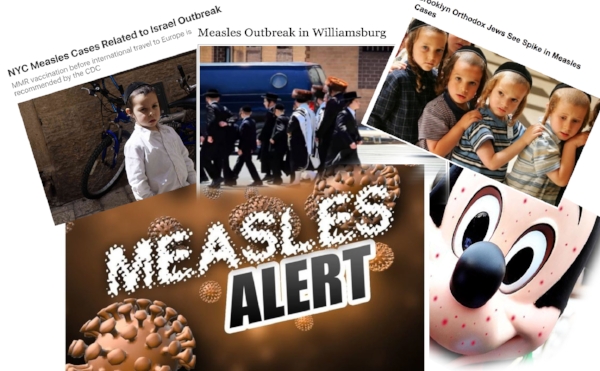Measles Alert
By Eve Mykytyn
On October 18, the Jewish Forward reported six cases of measles among Orthodox Jewish children under the age of four in Williamsburg, Brooklyn. Also noted were 11 cases of measles in Orthodox Jewish enclaves in Rockland County, New York.
This follows a larger outbreak in 2013 in the Orthodox Jewish community in Brooklyn, itself the third or fourth measles problem in the community since 2007, and following closely on the heels of a mumps outbreak that affected more than 3,000 people. In 2013 alone New York City spent $395,000 and more than 10,000 personnel hours to respond to the measles outbreak and keep it contained. Serious measles outbreaks have also recently affected the Orthodox communities in London, Jerusalem and Los Angeles.
Apparently, Orthodox communities vaccinate their children at lower rates than the general public. A study in London found lower rates of vaccination And recurrent outbreaks of vaccine preventable diseases suggest sub-optimal coverage.
Measles is a highly contagious, serious disease that was declared eliminated in 2000, but has made a comeback as vaccination rates have dropped. Before the introduction of the measles vaccine in 1963, major epidemics occurred approximately every 2–3 years and measles caused an estimated 2.6 million deaths each year.
In 2016, 89,780 people worldwide died from measles , mostly children under the age of 5 years, this despite the widespread availability of a safe and effective vaccine. Other dangerous effects from measles include death, blindness, encephalitis, and serious respiratory infections. Women infected while pregnant are at risk of miscarriage or preterm delivery.
The Medical Journal JAMA conducted a large scale study on rates of preventable diseases and their relationship to vaccination/nonvaccination. Pediatrician Matthew Davis, M.D., noted that The JAMA study showed that over one-half of measles cases occurred among individuals who were unvaccinated for nonmedical reasons.
Davis explains that vaccination protects against illness in two ways. “First, the person being vaccinated is protected…, [but] people are different in their immunity after vaccination. Many people get maximum benefit while some not as much…protection from vaccination can decrease over time… That’s what makes herd immunity — the second form of protection from vaccines so important… Herd immunity refers to how well immunized people in a community protect the less- or nonimmunized people in that same community.”
Dr Davis’ argument seems compelling, so why are the rates of vaccination among Orthodox Jews so low?
According to Chabad, Jewish law is not clear on measles vaccines. Rabbi Yehuda Shurpin explains that “Guarding your own health …[is] actually a mitzvah…It is not enough to deal with health issues as they arise; we must take precautions to avoid danger.” So far, it sounds like the Rabbi favors vaccinations. But instead he applies a balancing test without referencing medical knowledge. He asks if the small risk of death or complications from a disease makes it worth causing the child pain. “We are left with two opposing risks, and the Talmudic dictum of shev v’al taaseh adif—‘in some cases of doubt, better to sit and do nothing’ applies, and one shouldn’t vaccinate. Shurpin cites Rebbe Schneerson, “the axiom, ‘Do not set yourself apart from the community' applies. You should act according to that which is done by [the parents of] the majority of children who are in your children’s classes.”
Others in the Orthodox community are more outspoken. A prominent ultra-Orthodox Rabbi, Shmuel Kamenetsky, has called vaccines a “hoax,” [and] his beliefs are not uncommon in Orthodox circles.The rabbi claims, “Even the Salk [polio] vaccine is a hoax. It’s just big business.”
Whatever the justification, the London study found that “In a community relatively insulated from direct media influence, word of mouth is a potent source of rumors about vaccination dangers. Combined with religious fatalism and a more generalized concern about the potential for harm done to the community from outside influence, such rumors succeed in raising ‘vaccination anxieties to high levels.’
This finding is interesting because it seems that both the pro and anti vaccine camps in the Orthodox community focus on the health affects to the Orthodox community. But such communities do intersect with the larger world. I would think that part of the decision to vaccinate your child is based on the so called ‘herd effect’ of vaccination. That is, you have a responsibility to vaccinate a child not only so that he will not contract a disease but also to eliminate the prevalence of the disease and to insure that he will not give the disease to anyone else.
The Orthodox measles outbreaks are a sign that they are following their communities down a path that is not only dangerous for them, but for the rest of society as well.
